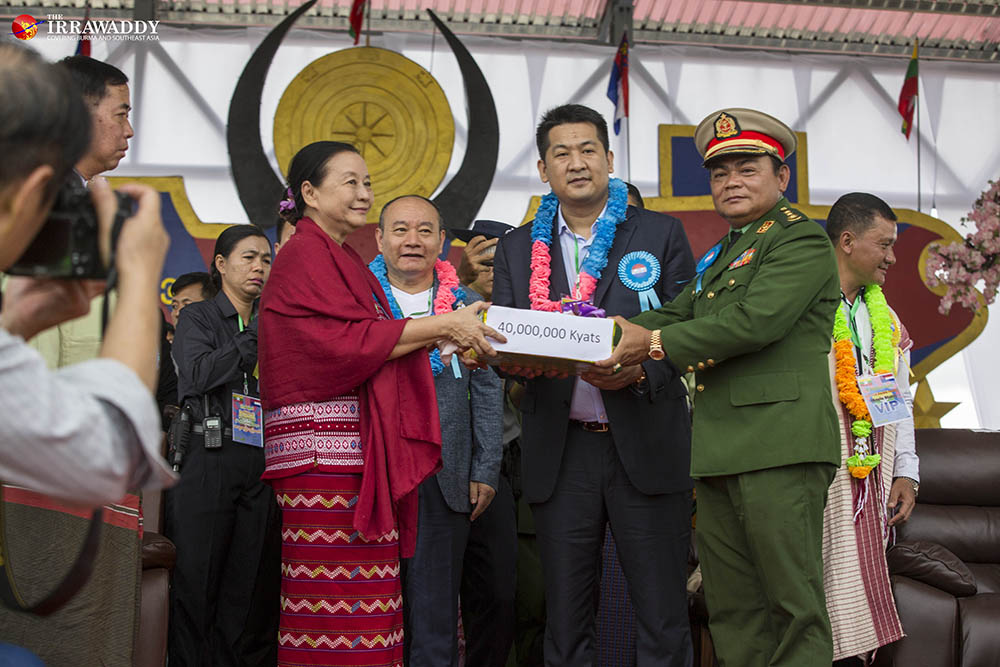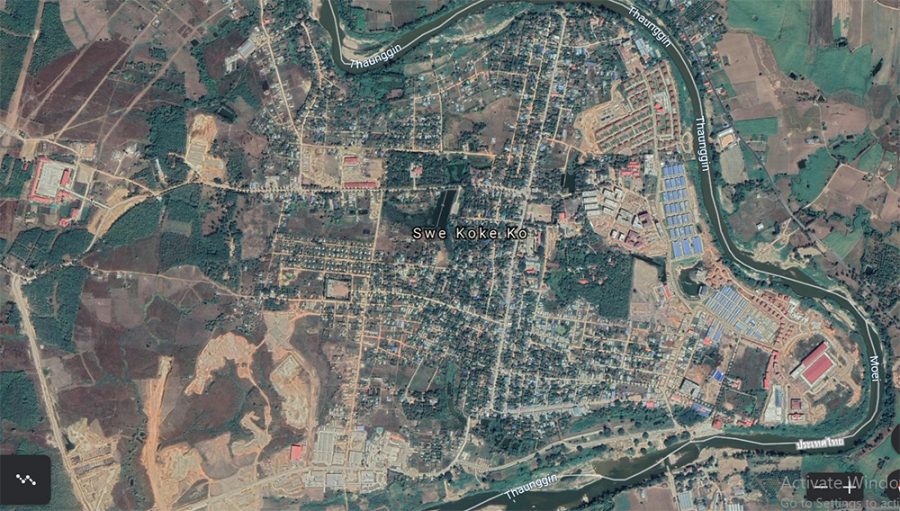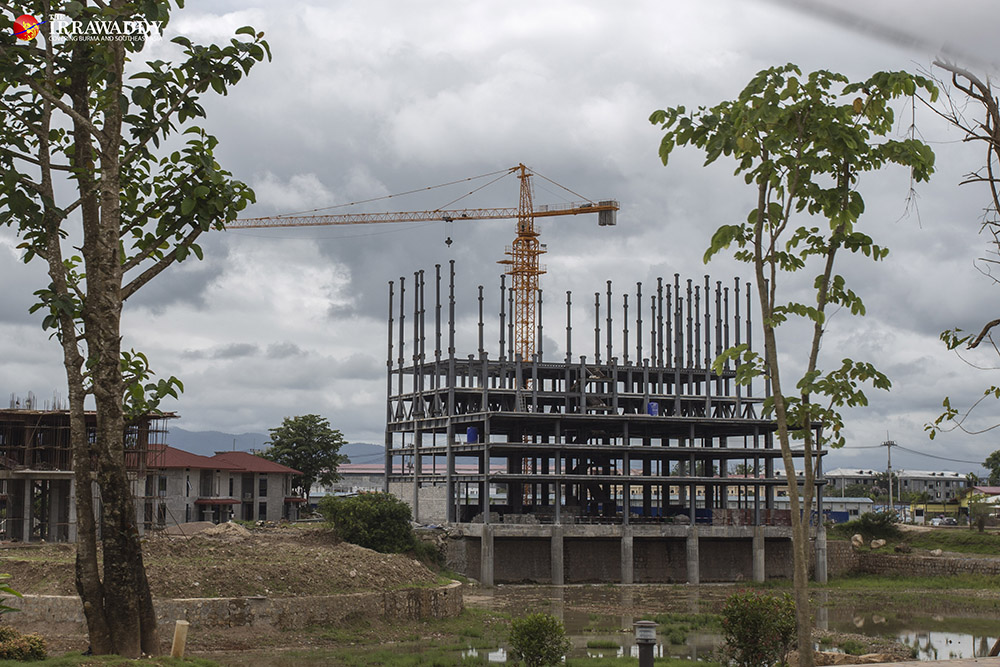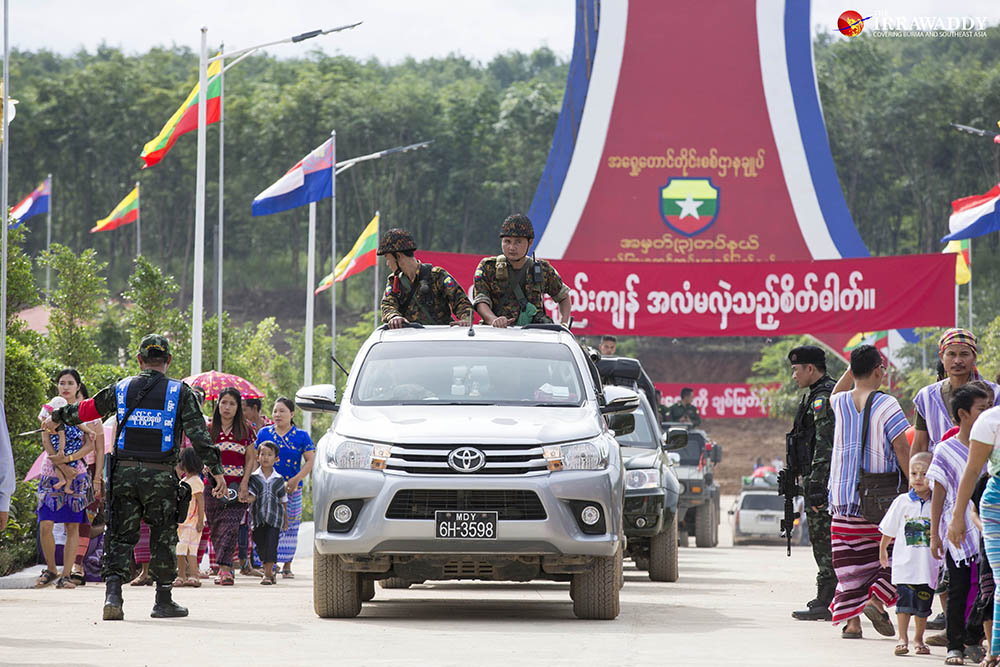The leadership of the Myanmar military-backed Karen State Border Guard Force (BGF) resigned en masse on Thursday to protest the resignation of their leader Colonel Saw Chit Thu under military pressure.
The mass resignations come as the Myanmar military (or Tatmadaw) puts increasing pressure on the BGF over the controversial China-backed Shwe Kokko new city project—in which some military and BGF officials are involved—in the border town of Myawaddy in Karen State.
A total of 90 officers, including 13 majors who command the BGF battalions, decided to resign in a show of solidarity with their senior leaders, according to BGF spokesman Major Naing Maw Zaw. The BGF has an estimated 8,000 troops under its leadership, according to the group.
The BGF members held a meeting on Thursday and “unanimously decided to resign”, as their leaders, including the BGF’s secretary, Col. Saw Chit Thu, had been forced to step down by the Tatmadaw, he said.
On Friday, the group held a meeting with military representatives led by Lieutenant General Aung Soe, chief of the Bureau of Special Operations in Naypyitaw, accompanied by the commander of the military’s South Eastern Command, Brigadier General Ko Ko Maung, to settle the issue.

Major Naing Maung Zaw told The Irrawaddy following the meeting that the military asked the BGF officers to “reconsider” their resignations, adding that the BGF would make a final decision after discussing the matter among themselves. But the military did not change its position on Col. Saw Chit Thu’s resignation, he added.
Military spokesman Major-General Zaw Min Tun told The Irrawaddy on Friday that the military “hopes for the best” from its team’s negotiations with the BGF, and urged the group to reconsider.
Last week, the military’s South Eastern Command based in Mawlamyine, Mon State summoned Col. Saw Chit Thu and other leaders for talks, but during the meeting requested that they resign “of their own volition”.
Following that, Major Saw Mote Thone, who was the BGF’s second-highest-ranking officer, resigned on Saturday.
Formerly known as the Democratic Karen Buddhist Army (DKBA)—a splinter group of the Karen National Union established in 1994—the group transformed itself to the Karen State Border Guard Force in August 2010, months before the general election of that year.
The military-aligned armed group is tasked with protecting areas along the Thai border in Karen State, serving as a local militia. At the time of the BGF’s formation, the military government did not have any ceasefire agreements with the dozens of ethnic armed groups across the country. The BGF received supervision and support from the military, in the form of military training as well as salaries and rations for the families of BGF troops.

During its decades of existence, the BGF has run a range of businesses including property, construction, gambling, casinos and security operations for entertainment complexes that include brothels, karaoke venues and massage parlors, and where drugs are known to be sold, in the areas under its control in Karen State.
Until last year, there were no tensions between the military and the BGF, which had been given free rein to do business while maintaining its arms.
The military stepped in when news reports emerged about public concerns over the lack of transparency and other irregularities with the Shwe Kokko city project, including the alleged involvement of Chinese criminals. Last month, the Tatmadaw tightened security in the area, with a battalion being stationed in Shwe Kokko Myaing, which is home to the headquarters of the BGF.
The US$15-billion (19.92-trillion-kyat) Shwe Kokko new city project, also known as “China Town”, is a collaboration between the Chit Lin Myaing Co. run by the BGF, and a Hong Kong-registered company, Yatai International Holding Group. Construction began in 2017.
Backed by Chinese investors accused of operating illegal casino activities in Cambodia and the Philippines, the project has been the subject of criticism for more than a year due to a lack of transparency, land confiscations, confusion over the scale of construction and the growing influx of Chinese money, as well as suspected illicit activity and local concerns about the social impacts of casino businesses.
The government launched a tribunal to investigate the project in June last year.
From August 2019 to October 2020, authorities from the Home Affairs Ministry and the army conducted inspections on the ground in the area five times and reported to the President’s Office.

Government spokesman U Zaw Htay said on Jan. 8 that the government in December issued instructions to relevant departments, including the Tatmadaw, which controls the BGF, on actions to be taken regarding the Shwe Kokko new city project.
“Since it is [run by the] BGF, they are under the control of the Tatmadaw. So, we advised the Tatmadaw to take responsibility for it,” U Zaw Htay said.
Military spokesman Maj-Gen Zaw Min Tun said the Tatmadaw, which has ultimate control over the BGF, had repeatedly warned it not to do business in uniform.
He said the BGF is free to operate legal businesses via its companies. But the military was forced to step in due to criticism that the business activities exceeded the scope of the permitted projects, he said, “because it affects the dignity of the BGF as well as the Tatmadaw, which supervises the BGF.”
“We took actions against those officials who violated the military regulations and some were forced to retire [over the Shwe Kokko project],” said the military spokesman, without revealing how many officials were punished.
In October, the military reportedly investigated at least three of its own senior officers for allegedly accepting bribes from the BGF to keep silent about illegal gambling activities at Shwe Kokko.
Discussions are reportedly ongoing between the Tatmadaw and the BGF to address the issue of illegal activities, including casinos and drugs.
The BGF leaders last week said it was unacceptable for the Tatmadaw to use casinos as an excuse to pressure them into resigning. They said they have contributed to the development of Karen State for the past 26 years, since signing a ceasefire with the military, and subsequently followed the Tatmadaw’s order to fight in the war against the country’s ethnic armed groups.

On Friday, a BGF source said on condition of anonymity that the group would keep their arms “as we always do”, but would no longer seek support in terms of salary and rations from the Tatmadaw.
The tensions between the BGF and the military has locals concerned over whether this part of Karen State will see a resumption in fighting between the two sides.
Major Naing Maung Zaw said that whatever the final decision, the group will stand on its own two feet as before. If the officers decide to resign, the group would no longer be a BGF, he said.
He insisted the group had no intention of disrupting the current peaceful situation in the state and would not provoke a return to conflict.
Dr. Min Zaw Oo, a military and security affairs analyst and director of the Myanmar Institute for Peace and Security, said he was optimistic the military and the BGF would be able to negotiate a resolution to the dispute over the Shwe Kokko project.
“In our assessment, the military will not let go of the BGF on this issue, as they have been together for years,” he said, adding that the current problem is not a military issue, but was prompted by business concerns, adding that the Tatmadaw had to intervene, as it is responsible for the BGF.
You may also like these stories:
Myanmar Secures Second IMF COVID-19 Loan
Myanmar Military Condemns Speaker’s Refusal to Probe Election Fraud Claims
Popular Shan Party Vows to Cooperate With Myanmar’s NLD Under New Govt

















